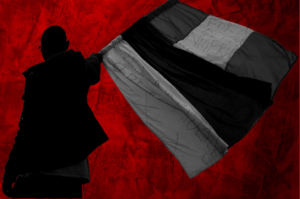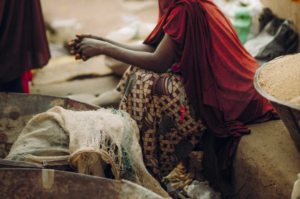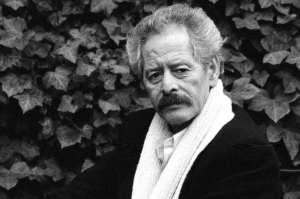
Dede Innocent attended the community grammar school at the heart of the village, but who taught children in a local secondary school about X and Y chromosomes? Or perhaps they were taught, but no one was really paying attention. Biology classes were mostly a bore, except the classes on reproduction. So, he grew up like every man in his time – looking for the woman who would birth him sons. Strong, healthy, tawny-skinned sons with taut muscles that flexed when they moved, and feet that made the ground tremble.
Chisara was a good woman. Her father had been the chairman of Amaala for many years before his death and the villagers still remembered him fondly for relieving them and their relatives in the cities of the burdensome burial rites imposed by the other chiefs.
When Dede Innocent came for Chisara’s hand in marriage, she was thin, ungainly and doe-eyed. The bones on her neck stuck out like gaunt tree branches in a cold, harmattan season. Dede Innocent mused to himself that she would have looked different if her father hadn’t been so honest all his life. In her mother’s village, Ozigbo, just six kilometers away from Umunze, the chairman of the Amaala moved about with a walking stick, not because he was too old, but because he was over-fed. Every burial in the village made him richer than the last. Regardless of her looks, Dede Innocent was happy with Chisara. She would make a submissive wife. It was in her eyes. She smiled at him shyly and struggled to meet his eyes when he spoke to her. Those were telling signs of a woman that would give her husband peace.
Eight years later, she still struggled to meet his eyes. This time, it was not because her husband overwhelmed her, but because her childlessness grieved her too much. The doctor at the specialist hospital in town had corrected her several times about calling herself ‘childless’, but she didn’t see why she should not. Having just one child after eight years of marriage, and a girl at that, was akin to being childless. Dede Innocent was beginning to grow impatient too. Among the men in his family, he was the most successful. He was the only one who completed secondary school, and his business of supplying plastic bags to the Chinese company in town had brought him in contact with ndi-ocha, and it did not matter that they were Asians. Any White person was considered oyibo and it intrigued his brothers that he understood them clearly, had complementary tea packets from them in his pantry and got a Christmas hamper from them every year. His house in the village was the largest structure built by any man from his clan, and he drove a clean, red Volvo that announced itself when he passed by.
And yet, he was the only man among his brothers without a son that bore his name. It made everything that he’d worked for seem futile. Who would inherit his two-storey building when he died? The students’ lodges he was building in town, the large farm beside his compound, and even his beautiful, red Volvo? Ahunna would one day get married and go to her husband’s house, and would not answer his name anymore. His brothers sounded like they sympathized with him, and their wives visited his house with pots of yam pepper soup each time Chisara lost a baby, but he didn’t trust that they were not gloating in private. Perhaps they told themselves that his Chi had denied him this one thing to even out the gains of each man. It bruised him that of all the things his Chi would think to deny him – a virile, prosperous and prominent son of the soil – it was a son. It was as bad as giving a woman beauty and wisdom and denying her a husband. What sense did it make?
By the ninth year of their marriage, he was certain he had worn the garment of endurance to raggedness. He even found Chisara’s demure silence irritating and her reverential submission annoyed him. This was the demeanor that had fooled him years ago into taking a barren woman as a wife, despite how thin and bony she had looked. It had obscured his senses and his ability to think well. Ordinarily, he should have known. He should have seen it, that with her hips so narrow, and her bones so thin she would have difficulty getting pregnant or keeping a baby. She had not even added any weight in all the years of being in his house, despite the food and comfort he provided. Nothing in her seemed to have the capacity to grow. She told him she would marry a wife for him as the custom permitted. He would impregnate the new wife, but the children would be hers just as it was done in their place. He refused. He didn’t want her input in his new life. The elders said it was good to remove the monkey’s hand from the pot of soup before it turned into the hand of a human being.
Two weeks after their daughter turned eight, he arranged Chisara’s things in a new box he’d bought from Upper Iweka market and sat it carefully inside the trunk of his car. When Chisara returned home from her Saturday church cleaning, Ahunna in her hand, their houseboy Ndibe, told her that oga instructed him to take her home – back to her father’s house.
***
There was something immoral, and at the same time exciting about how Nnenna’s body was formed. She had buttocks like a duck, huge and obtrusive, with hips that flared at her sides like a divine afterthought. It was as though her creator had created the first normal portion, then decided later that some extra would be nice, and then slapped on some extra pounds of flesh.
Dede Innocent had started frequenting the state university area after Chisara left, mostly to make supplies to his customers in town, but also to let off some steam. In the six months since Chisara left with their daughter, he’d sent them money every month and had visited twice to see Akunna. Chisara’s widowed mother often tried to plead with him. Who gave children, male children if not Chukwu? He did not return her daughter because she was wayward, or cantankerous. Her womb had simply refused to carry another child till term. Dede declined. Eventually, Chisara’s uncles returned the bride price and declared her free from her marital obligations to Dede Innocent. He would, however, continue to be responsible for their daughter’s welfare or be denied the privilege of receiving the wine from her in-laws when she was ready to marry in the future. He agreed willingly.
It was one lazy afternoon as he drove his Volvo around the students’ lodges that he first sighted the protrusion that was Nnenna’s buttocks. For a short woman, that was a mighty load to bear. She walked languidly towards one of the lodges, her feet stretching out delicately in front of her. He stared at her from inside his car, hypnotized by each slow step she took. It was as though a nymphic creature had stepped out of the river and was staring him in the face. Finally, Dede Innocent got down from his car and began to take fast, purposeful steps behind her. The rest would have been, as they say, history. But Dede Innocent’s Chi had written his life for more complexity than that.
One Sunday afternoon, Dede Innocent was listening to the radio, and the preacher said Jesus was angry with the fig tree in the bible, not because it had no fruits, but because it bore leaves, which implied from a distance, that it had fruits. Dede Innocent cried out, his hands in the air, “Eziokwu! Pastor, it is true!” He was not a religious man, and the days he attended Church were few and far between, but listening to the preacher that day, he felt a kinship with Jesus in his frustration with the fig tree.
Nnenna was a fig tree. A proud, stubborn, vile-mouthed fig tree that refused to cower in shame despite not fulfilling the purpose for which she was married. She was the weapon fashioned against him that was prospering. He had used his money to buy trouble. He had carried his brothers, and their late father’s aged, younger brother to pay bride price on the head of a woman whose only asset was behind her. When she had their second child, he’d stared at her and the baby in incredulous silence, but she’d compelled him to a performative smile by staring back at him with cold, dead-set eyes. One of the nurses said he stared at his own child like he wasn’t the father. He knew he was the father, quite alright. But this was not the agreement.
A while before she delivered, Nnenna had spent two weeks with her grandmother in the village, and Nnedi was famous in the village for altering the sex of children in the womb. Women came to her from neighboring villages and all she did was smack her palm on their bulge and speak to the fetus to become the preferred sex of the expecting mother. She did this effectively for other women, so why not her for her own grandchild who’d spent two weeks with her, receiving daily smacks on her belly? Besides, when Nnenna returned from her trip, he had done everything she asked him to do, from the basic to the ridiculous. She told him that Nnedi had a vision where his son in the womb said he would only stay if he was fed sufficiently. Dede Innocent did not have a problem with feeding anyone, much less his unborn son. If his son wanted to eat cassava until the bolus dribbled from Nnenna’s mouth, he did not mind. What was his money for?
He ran errands for her around the house with the slavish eagerness of Ndibe their houseboy. He was driving out almost every two hours to source for whatever cravings she had because his son in the womb constantly seemed to be hungry, and his demands were unusual. He wanted peppered akara and oats swimming in a glass of condensed milk. He wanted moi-moi in leaf wraps with egg inside, but without the yolk. He wanted nkwobi in the small local mortar used in the village, and not in a plate. And often he desired catfish pepper soup with well-stirred starch and a bottle of small stout to top it down. This son was acting wizardly, Dede Innocent told himself, but he would wait for him to arrive and properly school him that a child did not put their father – a titled Chief – through such errands just for their pleasure. He would address the fetal liberties he had allowed to thrive when the boy was finally born. Already, he had made him to forget the presence of his older sister in the house because his entire attention was on pleasing him.
But when Nnenna delivered their second baby, it was another girl. Dede Innocent knew that the nurse at the reception who’d congratulated him on his baby girl had to be joking. A son he had already named? So, he pushed his way into the hospital room where Nnenna lay, and headed straight to the child in her arms, flipping over the shawl to check the genitals. The sight confounded him and he lifted his face up to Nnenna, a woeful expression that demanded answers on his face. She did not have the good grace to look humble, to even look sorry. She stared back at him fiercely, as though to dare him to revolt. So, he swallowed the hot tears that were brewing at the corners of his eyes and broke into a smile. He did not know who caused him the most anguish: the son who rebelliously refused to come after all he had eaten from him, or Nnenna who eyed him back with the coldness of a witch.
This woman thought too highly of herself. Because he’d brought her in after sending his first wife away, she assumed herself to be the sacred hen. Or she thought that his obsession with her body was the solution to the problems of the world? He would show her that the broom used on the first wife was somewhere at the top of the roof waiting for the second. But Nnenna came with spine. She refused to go anywhere and she would run her mouth wildly when Dede reproached her. Their sonless state began to cause friction in their marriage, and they could both smell an emerging eruption at the tip of their noses. One day, he hit her, and she hit him back. He stood back, stunned. A woman raised her hands on him? He’d raised his hand to hit her face again when she fell at his feet howling, reminding him of the day he’d chased her at the University, and how he’d promised her the heavens and the earth if she married him. Now, he wanted to kill her with his hands; a breast-feeding mother?
For a moment, he remembered the days of their lovers’ trysts and how she’d teased him wildly with her youth and her body. He remembered the pacing anticipation of driving all the way from his business office to campus to visit her, and how it made him feel giddy and youthful that he was dating a university student. He used to announce proudly to his friends then – fellow business men in their late forties with just secondary school education – that he was going to see his university babe.
Perhaps, if a man did not have the burden of leaving behind a legacy, life would have been easier and he would not suffer the anxiety of seeking something that loved to elude him. He picked her up from the floor and wiped her tears. They would try again. The war between the nose and the mouth did not profit the face. And so, they tried again – two times more. And in total, Dede Innocent had five female children.
***
BTX Limited folded the year Dede Innocent turned fifty-eight. At the time, he had placed an order for the production of plastic bags worth millions of naira, certain that BTX would pay upon delivery. They could not. And he went into debt. Within eight months, he had lost his biggest customer, millions of naira and his will to live.
At home, he and Nnenna often took two days off, then resumed their spates of violence on the third day. They were famous in their neighborhood for their theatrical battles. It often started with howling sounds and loud thuds that could be heard from across their high fence, to dragging each other out either by the shirt or the hair to the front of their street, and finally, to reigning curses on each other. He called her a vile woman. She called him an old buffalo. The next day after this bedlam, they would walk together with their four daughters in tow, to shop at the big supermarket at the junction.
After BTX folded up, they could no longer reconcile by going for their grocery shopping sprees. It was in this season that Dede Innocent understood the Igbo proverb: Ji gwu n’oba, nwanyi ojo azaba oku ike. When there are no yams in the barn, a bad woman becomes hostile and insubordinate. Dede Innocent wanted them to cut down on expenses until he regained his feet. Nnenna refused. She could put up with a lot: a husband much older than her, a man who liked to hit her when he was provoked, even a man whose sexual appetite was tiresome. But she could not put up with a man who lacked money. Without money, she would see his weaknesses through a magnifying glass. Without money, he would make her simple demands seem like vanities.
The day that Dede Innocent drove to their village house to inspect his farmstead, she took their daughters and ran away. After three days of waiting unsuccessfully for her to return, he called her people to ask when he should be expecting a refund of the bride price. They told him when.
“Good riddance,” he whispered to himself after the call.
***
Nnenna’s exit did not feel like a loss to him; as far as he knew, she was a bad wife. Beautiful yes, but a far cry from the peaceful disposition of Chisara. Her university education had gotten into her head, and all the beatings he gave her that ordinarily ought to humble a wife, inflamed her and made her worse. To make matters irredeemable, all she did was litter his house with female children. Now, he had to take care of girls who he’d marry off one day to other men. He loved his daughters, but it was a heavy cross to bear.
What broke him was the downtime that his business was facing. For the longest time, he could not remember having to manage funds, or when he last experienced chest pain just to pay his bills. But recently, he solved math in his head before doing simple things such as stopping at a good roadside joint to eat isi ewu. It was like waking up one morning and finding that his manhood had gone missing. He could not understand why his Chi liked to tempt him with the things that defined a real man.
It was bad enough that he could not go back to the village during Christmas with his sons, and have them cut down the palm fruits on his farm, or represent him at the kinsmen meetings like the sons of his brothers did. To also become a man with a slim purse was akin to being afflicted with something as gangrenous as leprosy. It would make him contemptible before his brothers.
His new financially precarious state made him a thinker. He worried every day about how he would maintain his lifestyle and his reputation with his slowing business. The mothers of his children took care of their daughters, but he needed to contribute to their welfare so that his former wives and their families would not laugh at him in private.
At 62, all he had was a weathered Gulf car that he’d traded his beloved Volvo for, and his two houses – one in town and the other in the village, both of which he built at the peak of his wealth. His closest friend had advised him to sell the house in town and move into a two-bedroom apartment. What did he need a duplex for when he lived alone? Then, he’d advised Dede to put up a part of the house in the village for rent. Dede Innocent screamed. A titled Chief as himself, a son of the soil who people came to, to ask him to be chairman of their wedding, put up his house in his village for rent? And expose himself to the world that he needed money? Then, sell his house in town, a house he built to his taste and furnished with imported materials, only to go and live as an onye mgbu in a house built by another person and answer tenant? Fia!
Soon, his blood pressure got high and he became a frequent face at the clinic close to his house in the village. It was in this new clinic that he met Nurse Angela.
***
Nurse Angela did everything grandly. Where other nurses walked about with scowls on their faces, she smiled at patients. She sang Igbo songs when attending to patients and told them that angels passed the wards every night looking for happy people to heal.
Dede Innocent had come in one day to check his blood pressure as usual. She watched him quietly as the cuff on his arm inflated. Then, she stared at the gauge monitor and sighed. Dede Innocent looked at her and asked her what the problem was. She shook her head and said instead, “What is troubling you, Chief?” Dede Innocent sighed. Where would he start from? Business was not good. He did not have a son and he was staring at seventy. He did not have a wife to cook for him – Ndibe who had served him for years had long married and left – he was tired of paying different people to enter his house and do his chores. He needed money, sons, and a good woman who’ll give him foot massages and sing his praises. In that order. But he didn’t say these. He simply sighed again and said, “Nne eh! O diro easy.”
Nurse Angela slowly took the pump from his hand and set it aside. “You need peace of mind, Chief,” she said. Then she did something strange next. She began to run her fingers soothingly on his arms, her eyes staring soulfully into his. Dede Innocent stared at her, surprised. He did not know what to make of this. Since business became bad, he’d had less arrogance when chasing women, and besides a few flings after that scorpion, Nnenna left, he hadn’t really had the company of a woman he truly wanted. He looked the nurse over. She was not exceptional to the eyes. She was older than his two wives when he’d married them. But she was gratuitously offering. Perhaps, she could birth him sons. These medical people knew a thing or two about manipulating people’s bodies.
He exhaled sharply. “Nwanyioma, you’re right. I need a woman who will give me peace of mind.”
***
Nurse Angela had two sons. Not for Dede Innocent – for her ex-husband. Dede would have withdrawn when she told him she’d been married before with two sons. But the knowledge that males had once come out of her womb had gotten him delirious. He told himself that they would have a very small marriage ceremony. But as the days leading up to their traditional wedding came, he traded his recent frugality for the joy of hosting a big party as in old times. A burgeoning sense of fortune was swelling up in Dede. Angela was nothing like either of his previous wives. She was not timid or uneducated like Chisara, nor was she wild and brazen like Nnenna. Somehow, she straddled between the virtues of both. She told him she left her former husband’s house with a single polythene bag and the clothes on her back. He was a pastor but he had a cane he used on not just their sons. Dede Innocent feigned shock. “Why will any sane man use a cane on his wife?” Yes, he used to beat Nnenna, but she provoked him. And he never used a cane. He didn’t tell Angela this. It wasn’t important.
She showed him pictures of her and her sons. Although they were with their father, she visited them often at school. Dede Innocent looked to be sure the boys bore some semblance to her. They did. Blissful waters ran over his soul. He invited her to his house in the village. It was still proof of a man who had touched money in his lifetime – although his bank account told otherwise, but who knew? With his new wife, everything would pick up. A good woman brought good luck. And Angela had the trappings of a good woman. She had a bright and colorful personality. She prayed with so much gusto that Dede Innocent sometimes pitied the devil; the woman was constantly casting him out into deserted abyss. Chisara was a traditional woman. Nnenna said she was a Christian, but she was just a heathen who went to Church to flaunt the expensive clothes he bought for her. This one prayed loud. Also, she was a nurse so she would know something others did not. She had already started fussing over his meals and his drugs and talking about injections and supplements she’d give him to configure his chromosomal production. He didn’t understand the things she spoke of, but he did not care. He would take whatever she gave him. But the best part about her: she had pushed boys before. Not once, twice!
Their traditional wedding was big. Dede used the money he planned to use to open a new shop in Enugu to host the villagers and order expensive wines for his Umunna. Perhaps, the best sign of his good luck was that, a few months after they married, business began to pick up. It infused life into their budding relationship. Her exuberance humored him, and she welcomed herself into his life as though she had always existed there. Soon, he got used to, and even fond of her lavish love and hearing her high-pitched voice calling him, “Bab-eey!” It seemed to him that either her former husband scarred her so badly, or not at all. Why else did a woman leave her two sons behind and decide to marry another man? He decided not to bother himself with the whys of life.
When she got pregnant, Dede started to join her in her midnight prayers. He did not like the idea of shouting at God; it felt disrespectful, especially as he did not pray often. It seemed weird that the first time in a long time he was talking to God, it was in a commanding tone. Nor did he like the idea of shouting at the devil. But Angela shouted at both. So, he joined her every night shouting at the top of his voice, “Oh God! Release our sons! Ekwensu, wepu aka na ngozi anyi!”
The day Nurse Angela gave birth, Dede was inspecting a plot of land he wanted to buy in a neighboring town. His older brother had called him and howled that his wife had entered premature labor while visiting them. Dede excused himself and began to drive back home. By the time he got to the hospital where she was, she had been put to bed.
***
His brothers finally gained entrance into his house when one of their sons climbed over the fence and unlocked the bolt for his father and his uncles. They stormed into his living room and saw Dede seated on the floor, staring speculatively into space. He did not flinch nor acknowledge their presence. He simply shook his legs and continued to stare into space. Then his oldest brother spoke first.
“Innocent, ogini? Why did you run out like that? We were afraid you would have an accident on the road with how you dashed out. Why do you fold your arms like a woman who lost her husband?”
Dede Innocent looked up at the brother that spoke, and then at the rest before looking away. His brothers looked around his palatial home. It wasn’t every day they entered this house, but each time they did, the luxury in it floored them afresh. One signalled to the others and they took their seats on his expensive leather sofas, each man pleased with the lush feel of the throw pillows sidling close. Then one by one, they took turns talking, each one emptying what he hoped were words of wisdom and encouragement. They soon ignored Dede’s silence and the blankness in his eyes, and focused instead on the fact that he hadn’t run deaf within the distance from the hospital to his house. It was two long hours of speeches and anecdotes peppered with proverbs and prayers. And then Dede Innocent spoke. In truth, it wasn’t words. It first came out as muffled groaning, then punctuated sobs, until he was wailing and weeping like a widow.
They stared in shock. This was the wildest sight each man had seen in his life. “Inno, Inno what is this… Inno, why do you weep like a woman?” Dede Innocent thumped his chest and held his lips like one who was sworn to silence. He continued to shout, his voice aspiring to new heights with each dazed question from his brothers.
Then the oldest shouted, “Innocent, what is your problem?! Are you the first man whose wife gave birth to triplets?”
“No!” he screamed back, causing them to still. His utterance gave them hope and they stared at him, prodding him to speak.
“Which one is making you to weep like a woman? That Angela didn’t give birth to a son for you or that she had three girls at once? Kedi nke na-afu gi?”
“You want to know what is paining me, you want to know?” Dede Innocent stood up with a lurch and turned his back to his brothers. Then, he pulled his trousers down to reveal his buttocks and lifted his shirt up. They growled and turned to stare at each other, a silent question in each man’s eyes as to whether their brother had run mad. Uncle Innocent ran his fingers across the top of his buttocks. “Can you see? Can you see these?”
“We cannot see anything! What are you showing us, Inno?”
He turned to look at them, his eyes wide. “You mean you cannot see all these marks on my bum-bum?” he said turning sideways this time to give them another look. “You cannot see that my bum-bum is swollen? Unu a na-afu ya?”
His brothers stared at him and at one another in confusion, and then they got up one by one to near him, peering closely at his buttocks as he held his shirt up. He shook his head and dropped his shirt, then began to weep again. “That woman used injection to finish my bum-bum! She finished my bum-bum with multiple injections in the name of hormone nginiwa nginiwa.” Realization hit his brothers and they turned to one another, bursting into wild laughter. “Is this funny? I’m telling you that that woman said she can influence my… my comosome, I don’t even know the name, she called herself a nurse and I put my bum-bum down for her to be chuking injection into me, since she’s the one that went to school. She scattered my bum-bum, and still nothing, and you people are here laughing?” His brothers’ laughter continued to boomerang in the house and Dede Innocent shook his head, wiped his eyes and settled on the floor again.
He closed his eyes and he knew in that instant, that the devil was in the abyss where Angela had cast him, laughing wildly at him like his brothers.










Chigbundu Juliet October 13, 2023 08:24
Such an amazing piece, it was so intriguing that I didn't want to finish it